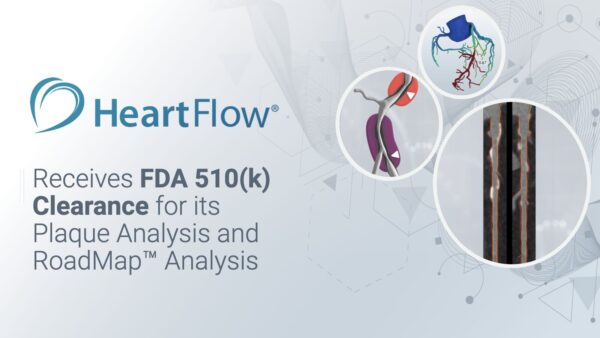|
HeartFlow Plaque & Roadmap | Metformin for AFib
October 20, 2022
|
|
|

|
|
Together with
|

|
|
|
“It’s my duty as a cardiologist to urgently inform every Dr, patient & member of the public that the mRNA product is a likely contributory factor in all unexpected cardiac arrests, heart attacks, strokes, cardiac arrhythmia & heart failure since 2021 until proven otherwise.”
|
|
Dr. Aseem Malhotra becoming the world’s most controversial cardiologist.
|
|

|
|
HeartFlow announced the FDA clearance of its new Plaque and RoadMap Analysis AI solutions, making it the “first and only” company to non-invasively assess CAD using anatomy, physiology, and plaque data from coronary CTA exams.
The new Plaque Analysis solution provides data on plaque (calcified, non-calcified, low-attenuation) with similar accuracy as IVUS (the gold standard), helping physicians assess their patients’ cardiovascular risks and adjust care accordingly.
RoadMap Analysis “brings stenosis into focus,” giving physicians visual and quantitative insights into the narrowing of all major coronary arteries (RCA, LAD, LCX, and Left Main), including stenosis location and severity.
HeartFlow’s CCTA AI expansion brings it into more direct competition with a growing field of plaque AI vendors (Cleerly, Elucid, Artrya, probably more coming). It also wouldn’t be surprising if some of those plaque AI companies plan to similarly expand into FFRct (Elucid’s FFRct is on the way), suggesting that a shift from CCTA AI point solutions to more comprehensive CAD assessment platforms could be coming.
The Takeaway
HeartFlow has become synonymous with FFRct, but suddenly has a portfolio of cardiac AI solutions (two reimbursable) that significantly expand physicians’ ability to support CCTA CAD assessments. That could be a big deal for HeartFlow, which can leverage its FFRct installed base, playbook, and reputation to bring its AI platform to cardiac imaging teams across the country.
|




|
|
HeartFlow FFRct’s Clinical Data Foundation
HeartFlow FFRct Analysis’ widespread payor support and adoption by 80% of the top 50 US heart hospitals is built on a deep foundation of peer-reviewed clinical research. See how HeartFlow FFRct has consistently proven to reduce unnecessary angiograms and the cost of care, making it a “game changer” for its users.
|
|
- Repurposing Metformin for AFib: Metformin, the popular type 2 diabetes medication, may be an effective AFib treatment. That’s the main takeaway from a Cleveland Clinic study that used AI to analyze 2,800 FDA-approved treatments, finding that metformin targets 30 genes associated with AFib (directly impacting gene expression w/ 8), and metformin users had significantly lower risk of AFib than users of other diabetes treatments (odds ratio = 0.48).
- Cardiology Career Flexibility: A recent ACC Health Policy Statement emphasized the benefits of cardiologist career flexibility, and proposed the adoption of more flexible training requirements, predictable work hours, and cardiologist roles that would allow career “deceleration” when desired. This statement has been in the works since before the COVID-19 pandemic, and is intended to address barriers that might deter future physicians from becoming cardiologists.
- FAPI PET/CT Predicts Sudden Cardiac Death: A new study out of China found that FAPI PET/CT radiotracer uptake can be used to identify hypertrophic cardiomyopathy (HCM) patients who have greater risk of sudden cardiac death. The researchers performed 18F-FAPI PET/CT imaging on 50 HCM patients and 22 healthy controls, finding that the HCM patients all had higher FAPI myocardial activity (8.8 vs. 2.1 median target-to-background ratio). HCM patients’ degree of FAPI activity was also directly correlated with higher 5-year sudden cardiac death risks (P = .03).
- Pfizer Brings Kickback Case to SCOTUS: After two previous defeats, Pfizer is heading to the Supreme Court to try and prove that its program to help Medicare patients pay for its tafamidis heart disease drugs (Vyndaqel and Vyndamax) doesn’t violate anti-kickback laws. Pfizer argues that because the program doesn’t have corrupt intent, its payments shouldn’t be considered kickbacks. However, the HHS and two lower courts disagreed, and critics allege that Pfizer is mainly trying to undermine the HHS’ ability to protect against practices like this.
- Medtronic’s Abre Evidence: The final results from the 36-month ABRE clinical study show that Medtronic’s Abre venous self-expanding stent system is safe and effective for the treatment of deep venous disease. The study included a high proportion of patients with complex cases (47.5% w/ PTS, 44% w/ stents below inguinal ligament, 112.4mm mean lesion length), and found that Abre stent treatments remained effective through 36 months (81.6% primary patency rate, 89.3% freedom from CD-TLR rate, no stent fractures or migrations, sustained quality of life improvements).
- Apple Health Coverage: Apple could start offering health coverage in 2024 as it looks to take advantage of Apple Watch-generated data, at least according to analysts at CCS Insight. Apple already collects data including blood pressure, blood oxygen, ECGs, as well as temperature and medication information introduced with the Watch Series 7. This data, combined with the deepest pockets in the business, could give an Apple health plan a huge advantage if launched in partnership with a major payor.
- AFib Detection Struggles: On a less rosy note for the Apple Watch, a new study in the Canadian Journal of Cardiology found that the wearable’s ability to detect atrial fibrillation is significantly impacted by underlying ECG abnormalities. The authors tested the Apple Watch ECG’s ability to detect AFib in 734 patients (154 with AFib), finding that the watch failed to produce an automatic diagnosis in 20% of AFib patients, with a large percentage of the failures due to either underlying bradycardia (34%) or tachycardia (6%).
- Reducing Post-PCI Triple Therapy: A Beth Israel Deaconess Medical Center quality improvement initiative significantly reduced its use of triple therapy (TT = oral anticoagulants + dual antiplatelet therapy) among discharged post-PCI patients. The BIDMC initiative specifically encouraged discharging patients on oral anticoagulants with a P2Y12 inhibitor or reducing their TT duration to ≤30 days. During the 18 months after the initiative, mean TT duration decreased (58.7 to 37.8 days) and the share of patients discharged with ≤30 days of TT increased (24% to 37%).
- FDA Digital Health Policy Navigator: The FDA’s recently released regulatory guidance just became a lot more digestible after the agency debuted an extremely useful tool called the Digital Health Policy Navigator. The tool can help digital health startups determine whether their product falls under the FDA’s oversight through a relatively painless 7-step process.
|
|
Personalized Care Pathway for Heart Attack Prevention
More than 50% of patients who suffer a heart attack are considered “low risk” based on symptoms, but in fact do have plaque build up. Cleerly tackles the matter head-on in their 5-step care pathway for early diagnosis, informed decision making, and personalized treatment.
|
|
Cardiovascular Structured Reporting Adoption Benefits
Check out this Change Healthcare report detailing the benefits of cardiovascular structured reporting, and how to drive structured reporting adoption in your own organization.
|
|
|
|
|